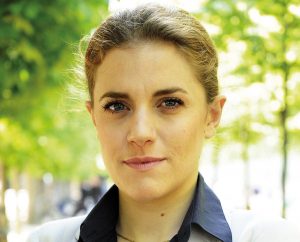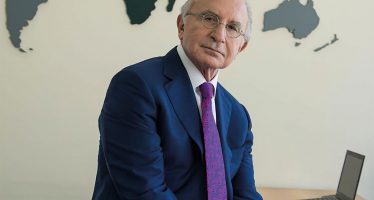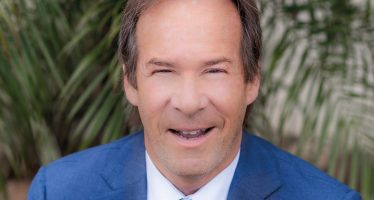Bon Courage: Hard Work, a Tight Team and a Bold Approach Have Taken Le Groupe La Poste Ahead

Director of Strategy: Diane Abrahams
Le Groupe La Poste’s director of strategy, Diane Abrahams, believes in challenging the status quo. “We must have the courage to surround ourselves with people who contradict us,” she says. “They help us escape our own cognitive biases.”
In 2015, Abrahams joined Le Groupe La Poste’s Service-Mail-Parcels business unit; she was appointed director of the Paris Nord Gonesse Mail Industrial Platform in 2016, leading 650 workers into industrial modernisation. She became head of strategy, partnerships, and innovation at Le Groupe La Poste in 2019, the position she currently holds.
Her career path began in 2008 as sustainable development officer for a social housing company after graduating from the prestigious Ecole Polytechnique and from Ponts et Chaussées. She later joined the sub-directorate for sustainable development of the French Civil Aviation Authority as head of the emissions unit.
In 2012, Abrahams joined the French Ministry of Ecology, Sustainable Development and Energy as an advisor in charge of nuclear safety and security and technological risks. She was also in charge of moving to a circular economy and governing policies on waste and environmental health.
Diane Abrahams is involved with associations encouraging young women to take up scientific careers, and secondary school students from disadvantaged social backgrounds to pursue higher education.
“I joined the La Poste Group because it is a company that is highly innovative, a pioneer in the environmental field and capable of testing services that are intensively human, such as visits to the elderly, as well as services that are increasingly technological, such as VR-augmented mail or digital certified identity
“It has a very strong social model; 7.7 percent of our employees are recognised as disabled, and we consulted more than 140,000 people — 135,000 of them postal workers — to draw up our strategic plan,” she says. “It’s exciting to work for a company with this culture: we innovate, and we do so with extra meaning. It’s very strong.
“The stakes are not only enormous — €31.2bn in sales, 249,000 employees — but above all, particularly human. Le Groupe La Poste wants to retain as many postal delivery jobs as possible, even though the volume of mail has halved in 10 years.”
La Poste’s bank is the first to offer services to vulnerable people in France, and the only option for those excluded from traditional banking. “I get up in the morning for the people who need us, to find long-term solutions,” she says.
To be a strategy director at the end of one Strategic Plan (2014-2020) and about to build a new one projecting to 2030 is “special”, she says. “We put all the subjects on the table, nothing was taboo. My added value was to ensure that we didn’t forget any strategic option, that we didn’t let short-term habits win out over strategic ambition. We have remained coherent on the strategic big picture, and we haven’t left any central questions unanswered. It’s an exciting collective challenge.”
Like all successful businesses and operations, it comes down to an effective workforce, she believes. “My team is small, and must have the particular ability to cross-functionalise projects, subjects, solutions and ideas from one business line to another within the group.
“The team members must all have a clear idea of what their colleagues are doing. We must get along with one another, otherwise we are no longer useful. Teamwork is a real strength: we did not call on any outside consultation to produce the 2030 strategic plan of the group.
“It’s a team that is curious about everything, that has to be able to slip in the right contact or the right idea from outside. For that, they have total autonomy. They also need to ‘press where it hurts’ sometimes, which requires a lot of rigour and finesse.”
Diane Abrahams sees her role in La Poste as ensuring that the strategic options of a branch or subsidiary do not destroy value elsewhere in the group. “I believe that this mixture of free creativity and more austere instruction is ultimately a richness in any team.”
What are the key traits of a good corporate leader? “A leader who surrounds himself with a team of diverse profiles,” she replies. “Only diversity offers new ideas, abundant brainstorms, points-of-view that illuminate blind spots. I think that the similarity of profiles and hires in a team is deadly.
“A good leader applies the principle of subsidiarity, does only what his departments or teams cannot do. A corporate leader must be a bit stubborn on the vision, square on some objectives, exemplary and uncompromising in his or her own practices with respect to speech and values. But then they must be able to delegate. Otherwise, the leader’s own added value will be less than what it could be.
“A good leader knows the field, and hears the field. I am struck by how quickly we can forget that, behind a PowerPoint presentation or a sentence in a decree, there are people, places, working conditions… A regular reality check seems indispensable for leadership that produces positive added value.
“When I see a leader to whom no one dares to say no, I know that he or she has reached the end of their usefulness.”
You may have an interest in also reading…
Head of International Banking at Bank One Carl Chirwa: Banking the Future in a Post-Covid-19 World
“Two years down the line, I can safely assume that most businesses – including banks – have had to tear
Metito: Group with a Grasp of Synergy and Solidity
Globally, Metito is recognised as a brand of trust and a provider of choice for intelligent water and alternative energy
CFI.co Meets the CEO of Retail Opportunity Investments Corp. (ROIC): Stuart Tanz
California-based Retail Opportunity Investments Corp. (ROIC) acquires, owns and manages grocery-anchored, open-air shopping centres on the US West Coast. Since


















































































